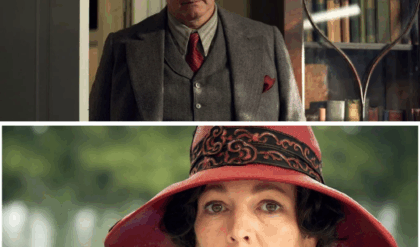In the rain-slicked underbelly of Edinburgh, where the fog clings to cobblestones like a guilty conscience and the ghosts of old crimes murmur through alleyways, the line between hunter and hunted blurs into oblivion. For fans of Nordic noir, the Department Q novels by Danish maestro Jussi Adler-Olsen have long been a descent into moral quicksand—tales of forgotten victims clawing their way back from the cold files of bureaucracy. Now, Netflix’s Dept. Q has transplanted that chilling ethos to the Scottish capital, birthing a series that crackles with damp despair and razor-sharp wit. Season 1, which dropped all nine episodes on May 29, 2025, like a verdict from the shadows, introduced us to Detective Chief Inspector Carl Morck: a brilliant wreck of a man, played with brooding magnetism by Matthew Goode. Haunted by a botched raid that claimed a young officer’s life and left his partner paralyzed, Morck is exiled to the bowels of police headquarters—a forgotten basement dubbed Dept. Q, tasked with sifting through the detritus of unsolved cases no one else wants.
But exile, for a man like Morck, is just the spark to a powder keg. What begins as a punitive shuffle through yellowed dossiers spirals into a vortex of corruption when he cracks open one file in particular: the disappearance of prosecutor Merritt Lingard, a rising star presumed drowned in a ferry accident five years prior. As the season unfolds, that “suicide” unravels into something far more grotesque—a meticulously orchestrated abduction, a tale of obsession and institutional rot that threatens to engulf not just the victim, but the entire Edinburgh constabulary. You won’t believe what was hidden down there all this time: layers of complicity, from high-society enablers to badge-wearing betrayers, all woven into a web that pulls Morck toward his own unraveling. It’s a story that doesn’t just question justice; it indicts it, forcing viewers to confront the twisted undercurrents where lawmen become the monsters they chase.
The series, helmed by Oscar-winning scribe Scott Frank—whose fingerprints on The Queen’s Gambit and Godless scream prestige procedural with a soul—marks a triumphant pivot from Adler-Olsen’s Copenhagen-set originals. Frank, who snapped up adaptation rights back in 2014, initially eyed Boston’s brick-and-mortar grit before settling on Edinburgh’s gothic splendor. “Scotland’s got that perfect brew of history and haunt,” Frank quipped in a pre-premiere chat, and boy, does it deliver. Filming kicked off in February 2024 amid the city’s drizzling chill, transforming Leith’s Lysander House into Dept. Q’s claustrophobic lair and the John O’Groats ferry into a spectral stage for recreating Lingard’s fateful voyage. The production, a Left Bank Pictures-Netflix collab, ballooned to nine episodes from the planned eight, allowing Frank to luxuriate in the psychological meat: Morck’s sarcasm as armor, his insomnia-fueled stakeouts lit by the flicker of a desk lamp, and the slow-burn camaraderie that turns misfits into a makeshift family.
At the helm is Goode’s Morck, a tour de force of frayed elegance. The Downton Abbey alum channels a Carl who’s equal parts Byronic hero and battered everyman—silver-tongued in interrogations, but crumbling in the quiet hours with a tumbler of whisky and regrets. The inciting carnage hits like a gut punch: a raid gone sideways, bullets flying in a dimly lit warehouse, and Morck emerging bloodied but breathing, only to learn his hesitation—or was it hubris?—sealed a rookie’s fate. “He got another cop killed,” the brass sneers, banishing him to the basement with a skeleton crew and a mandate to “close files, not open wounds.” Goode nails the nuance, his eyes hollowed by grief yet sparking with that predatory intellect Adler-Olsen gifted the character. Flashbacks pepper the narrative, replaying the raid in fragmented horror: the crack of gunfire, Hardy’s agonized fall, and Morck’s frozen split-second that echoes through every cold case he touches. It’s a performance that earned Goode early Emmy whispers, blending vulnerability with venom in lines like, “Justice isn’t a light switch, Superintendent. It’s a bloody fuse.”
Morck’s reluctant squad forms the series’ beating, if bruised, heart. First recruit is Akram Salim, portrayed by Alexej Manvelov with a quiet ferocity that steals scenes. A Syrian ex-cop turned refugee, Akram petitions for a desk job but finds himself knee-deep in fieldwork, his outsider’s eye piercing the parochial veil of Scottish policing. Manvelov, drawing from his own immigrant roots, infuses Akram with a steely optimism undercut by trauma—nights haunted by Aleppo’s ruins, days decoding Lingard’s cryptic final emails with a linguist’s precision. Their dynamic crackles: Morck’s curt barbs met with Akram’s unflinching gaze, evolving from mentor-apprentice friction to a bond forged in shared exile. “You’re not from here,” Morck snaps early on. “Neither are you,” Akram retorts, a line that lands like a revelation.
Then there’s Rose, the wildcard wildcard played by Leah Byrne with feral intensity. A former academy hotshot sidelined by a breakdown—panic attacks mid-arrest, whispers of “unfit for duty” trailing her like smoke—Rose crashes Dept. Q’s door begging for redemption. Byrne, a Call the Midwife vet, layers her with raw edges: chain-smoking in stairwells, her encyclopedic recall of forensics masking a fragility that mirrors Morck’s. Her breakthrough comes mid-season, piecing together Lingard’s submerged timeline from tidal charts and witness sketches, only to trigger her own submerged demons. The trio’s alchemy—Morck’s cynicism, Akram’s empathy, Rose’s fire—turns the basement into a pressure cooker, where banter (“Pass the files, not the blame”) belies the stakes. And lurking in the wings is Jamie Sives’ James Hardy, Morck’s wheelchair-bound partner, whose bedside vigils and bitter video calls add a layer of fraternal guilt that gnaws at the edges.
Season 1’s engine is the Lingard case, a labyrinthine beast that devours episodes with escalating dread. What starts as a routine review—grainy ferry CCTV, a widow’s tearful plea—morphs into a nightmare of confinement and control. Without spoiling the visceral turns, the investigation unearths a captor whose psyche is a funhouse mirror to Morck’s: methodical, vengeful, hiding in plain sight among the elite. Clues cascade like Edinburgh’s relentless downpours: a rusted locket washed ashore, encrypted ledgers hinting at prosecutorial blackmail, and a trail of silenced witnesses leading to a crumbling estate on the Isle of Mhòr. Frank’s script, co-penned with Chandni Lakhani, Stephen Greenhorn, and Colette Kane, weaves Adler-Olsen’s plot with fresh veins—cultural clashes in Akram’s interrogations, Rose’s feminist fury at institutional gaslighting—while amplifying the basement’s isolation. Cinematographer Stuart Dryburgh bathes scenes in desaturated grays, the occasional slash of crimson (blood on linoleum, Lingard’s forgotten lipstick) jolting like a heartbeat.
Yet Dept. Q isn’t content with procedural thrills; it’s a scalpel to the soul of law enforcement. Morck’s demotion exposes the rot: superiors like Superintendent Moira Jacobson (a steely Kelly Macdonald) funneling budgets to flashy active cases while cold files gather dust, PR stunts masking systemic neglect. Chloe Pirrie’s Merritt Lingard haunts as both victim and catalyst—flashbacks reveal a woman whose ambition made enemies in high places, her “drowning” a convenient erasure. The season probes consent and captivity with unflinching intimacy, drawing parallels to real-world reckonings like Scotland’s handling of historical abuses. Frank directs the opener and finale with taut economy, his touch evident in the score’s brooding cello swells and the ironic folk tunes underscoring stakeouts. It’s dark humor amid the deluge—Morck quipping, “Cold cases are like bad exes: they never really leave”—that keeps the abyss from swallowing whole.
The fandom’s frenzy hit fever pitch post-premiere, with Dept. Q storming Netflix’s Global Top 10 for six weeks, amassing 27 million views and an 88% Rotten Tomatoes nod. Critics swooned: Entertainment Weekly’s A- hailed it as “broken souls mending through mercy’s shards,” while The Guardian’s four-star rave praised the “lean script channeling Morck’s spitting sarcasm.” Social feeds exploded—#DeptQBasement trended with fan theories on Lingard’s fate, edits splicing Goode’s glare over Adler-Olsen quotes, and Reddit threads dissecting Akram’s arc as “the heart Nordic noir needed.” Indigenous voices? Wait, no—wait, Scottish pride swelled, with locals buzzing over cameos at Staggs Bar in Musselburgh and Vogrie House’s eerie halls. Binge-watchers confessed to “sleep be damned” marathons, one X post viral: “Morck’s basement feels more alive than my flat. Send help—and season 2.”
That plea? Answered swiftly. On August 18, 2025—barely three months post-drop—Netflix renewed for Season 2, a testament to the series’ grip. “We’re raring to return to Carl Morck and his band of glorious misfits,” beamed execs Mona Qureshi and Manda Levin, teasing “what Morck and the gang uncover next.” Frank, ever the provocateur, hinted at a hybrid beast: “Another cold case crashing into a hot one,” blending Adler-Olsen’s The Absent One with bespoke twists. Expect the core crew—Goode, Manvelov, Byrne, Sives—back in the fray, probing a decades-old sibling slaying tied to a cabal of boarding-school elites. The shooter from Season 1’s opener? Still at large, a dangling thread promising personal Armageddon. Romance flickers too—Morck’s prickly ex (hinted in cameos) and a potential spark with a forensic shrink, per Goode’s coy teases. Filming eyes early 2026, with Edinburgh’s mists as eternal co-star, aiming for a late-year drop.
What elevates Dept. Q beyond binge fodder is its unflinching mirror to fractured institutions. In an age of police reckonings—from U.S. reform cries to U.K. inquiries—Morck’s odyssey indicts the badge’s burdens: how trauma festers unchecked, how “cold” cases bury the vulnerable. Adler-Olsen’s 10-novel vault (the latest, Locked In, fresh in 2024) offers endless fuel, but Frank vows fidelity with reinvention—”gold from the book, then our own veins.” For Goode, it’s cathartic: “Carl’s chaos lets me unpack my own knots.” As Season 2 looms, one truth endures: in Dept. Q’s depths, no secret stays buried forever. The basement door creaks open again, and whatever twisted horror awaits, it’ll destroy—or redeem—the force, and the man who guards it. Tune in; the files are calling, and they whisper your name.





